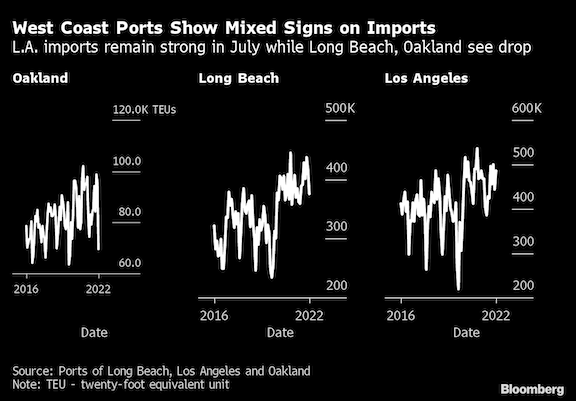Incoming container cargo to the Port of Los Angeles -- the largest in the US -- rose to the most on record for the month of July, indicating that retailers and manufacturers were still replenishing inventories heading into the second half of the year.
The Southern California port handled an estimated 485,472 million 20-foot-equivalent units last month, a 3.4% increase from the same month last year, according to preliminary figures released on Wednesday. Total cargo handled by the port reached 6.35 million containers in the first seven months of the year, up by a modest 0.5% from the year-earlier period.

“We continue strong and the outlook remains that way,” Executive Director Gene Seroka said in a virtual briefing Wednesday. “The American consumer’s resilience to buy remains almost unabated. We’ll see strong numbers -- I think this year we come in with a Top 3 all-time Port of L.A. year in general.”
West Coast ports are registering an earlier-than-normal peak season this summer as many retailers try to avoid last year’s experience, when they struggled to secure their goods, from clothing to electronics, because of serious shipping delays. Since then, supply chains bottlenecks on the docks have significantly cleared up.
Meanwhile, California’s third-busiest port in Oakland shut down for almost a week last month after truckers protesting a gig-work law that could take 70,000 California drivers off the road blocked access to the operation. Although activities have fully resumed, Oakland handled 27% fewer loaded inbound containers last month compared to June and the prior year.
The port attributes the biggest drop since the onset of the Covid-19 pandemic to the protests rather than to a shift in consumer sentiment, and is now expecting an uptick in imports in the upcoming months as delayed vessels make their way to the San Francisco Bay, according to Maritime Director Bryan Brandes. “Oakland will see that volume, it’s just going to be delayed into August,” he said in an interview.
The National Retail Federation warned last week that retail shipments are expected to retreat in the second half of 2022, following record-setting volumes earlier this year.









